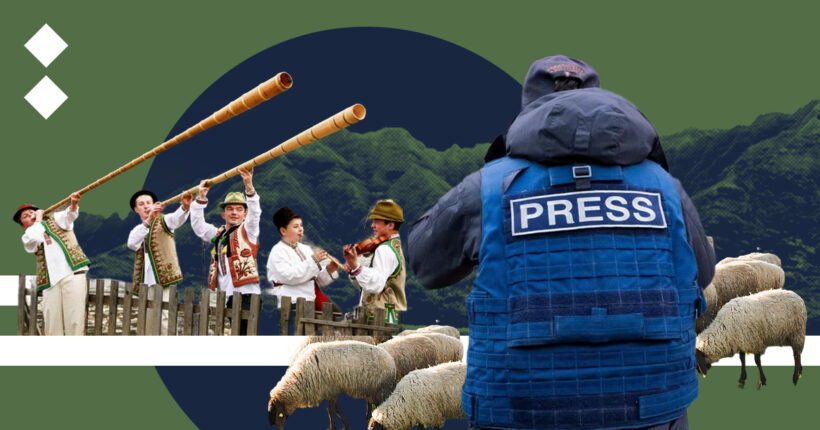
What is the problem?
During the war, we worry about our own lives and the lives of our loved ones every day. We read disturbing news, and we worry about our future. As a result, we have constant stress, tension, and overload of the psyche and nervous system.
To overcome emotional exhaustion, also called emotional burnout, psychologists often advise switching the focus of your attention from war events to mundane, everyday things, stopping constantly scrolling through news feeds, and immersing yourself in family or work. However, for media professionals, journalists, editors, and photo and video correspondents who process a massive amount of difficult content every day, most of these tips do not work. They do not have the opportunity to abstract or unsubscribe from the news because this is their work, life, and conscious choice.
"According to the research of the Lviv Media Forum, 36% of Ukrainian media workers need psychological support. From February 24, 2022, the editorial teams of Ukrainian media have worked in extremely difficult conditions. They face threats to personal safety, financial instability, chronic overtime, and psychological pressure. All this, in a complex, leads to professional burnout. But media people ignore exhaustion because they feel responsible for their audience," says Dara Shalova, communicator of the Lviv Media Forum.
What is the solution?
With the support of the Prague Civic Center, the Lviv Media Forum launched the Psychological Support Program for Ukrainian media workers. Retreats in the Carpathians became part of it — a response to the challenges of wartime. A one-week stay surrounded by mountains and healing nature became an opportunity for the participants of restorative retreats to relieve daily stress — change the situation and slow down and "exhale," even for a short period, reboot, and return to work with new strength and energy.
How does it work?
Retreat is a period of personal or group seclusion for spiritual or psychological work on oneself. There are spiritual retreat seminars in many religious traditions. Still, in modern society, the principles of retreat have also begun to be used in professional spheres — in business, politics, and sports. Immersion for a certain time in conditions without stimuli that cause fatigue and tension helps overcome accumulated stress, find answers to unresolved issues, and increase efficiency and effectiveness. During the war, the issue of psychological recovery through a kind of "switching" became even more urgent.
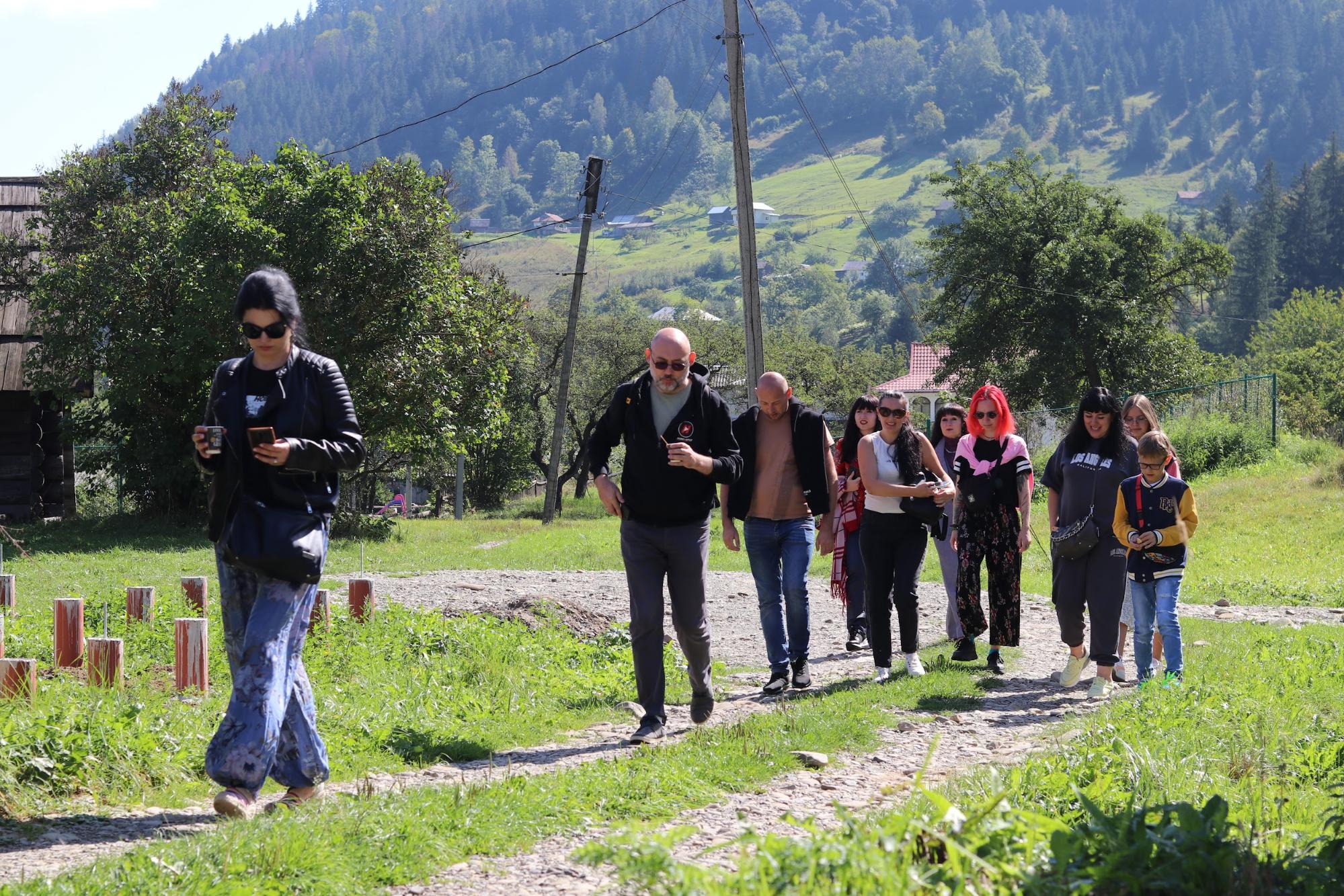
One of the elements of resource activity can be hiking. Photo: participants of the retreat project of the Lviv Media Forum
"In such a field of activity, where specialists are in contact with difficult news and with traumatic and painful stories of people every day, there is a high risk of burnout, exhaustion from communication, listening, vicarious trauma (or it is also called "compassion fatigue"), fatigue from constant changes in news, excessive anxiety and background stress, in addition to the challenges people face every day," says Olena Solonina, the clinical psychologist, consultant at methods of cognitive-behavioral therapy, schema therapy and EMDR, who has been providing psychological assistance to media workers since the beginning of the full-scale invasion. "It is important to remember that taking care of yourself is the duty of each of us. We often set aside time for important things we need to do, but it is also important to include resource activities, breaks, rest, and communication with loved ones in our diary, which can give us strength and improve our mood."
The idea of retreat residences of the Lviv Media Forum is precisely to improve journalists' psycho-emotional state and promote the restoration of internal resources and balance.

Trusting communication with domestic animals is a kind of Carpathian animal therapy. Photo: participants of one of the retreats of the Lviv Media Forum
"The place of our retreat project was the Carpathians, which we believe are capable of switching participants from survival mode to rest mode, at least for a while," says project manager Sofia Shovgeniuk. "We saw that in addition to getting to know the culture and nature of the Hutsul region, an important component of recovery is the opportunity to exchange experience and communicate with colleagues. Amid war, it is precisely such informal interaction and support that many lack."
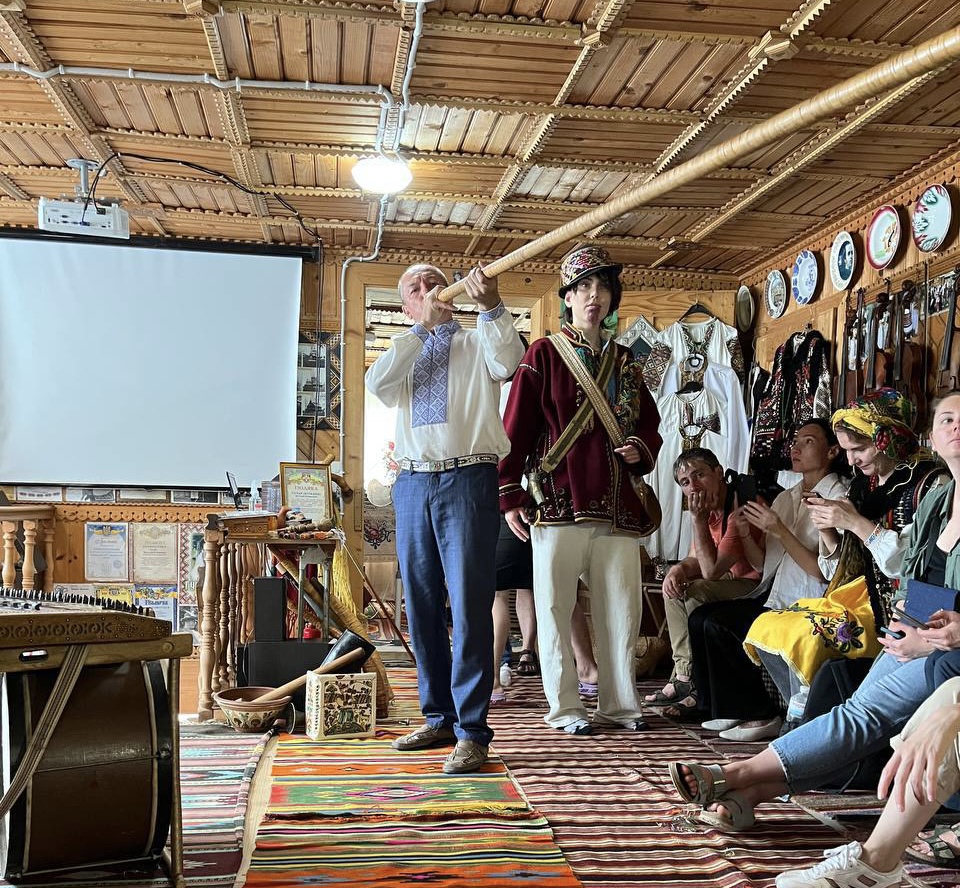
Participants of the Lviv Media Forum retreat on an interactive tour of the museum.
The initiative of the Lviv Media Forum on psychological reset in nature found a great response from Ukrainian media workers — the organizers received more than 1,000 applications from journalists from all over Ukraine in 2022. The conditions for participation in the retreat were the need to reset and receive psychological help, having two years of media experience before a full-scale invasion, and working on the front lines or other similar experiences.
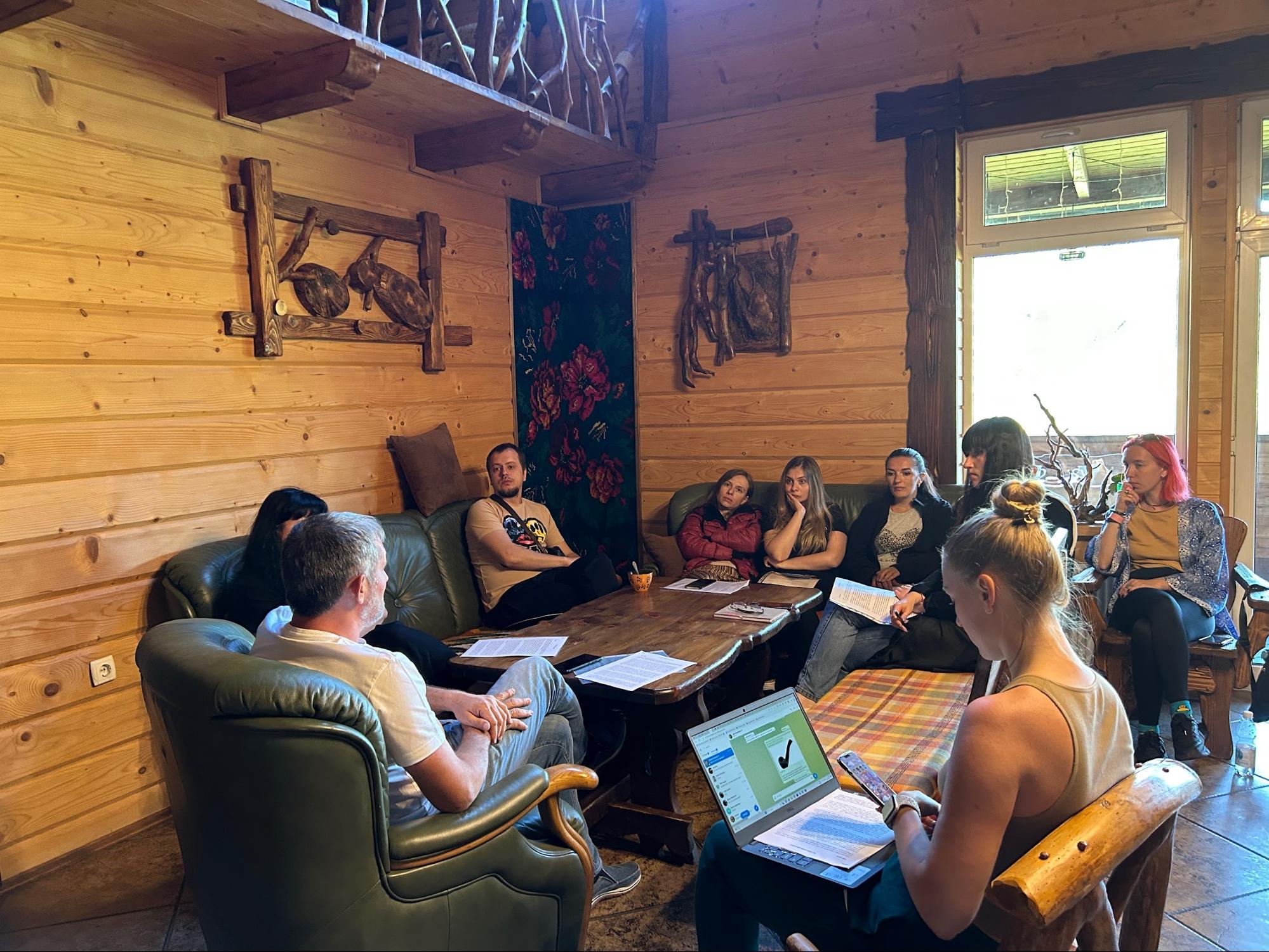
Educational session on "How to get a grant for your media project."
The duration of the retreat is eight days. The visits combined a cultural and educational component: rest in the VODAclub complex in Bukovel, hiking in the mountains, rafting, a walk through the Kosiv market, watching and discussing films by Ukrainian artists, and visiting several museums. In the educational part, the session "How to get a grant for your media project" took place, where media representatives received answers to questions about donor support. Every day, the participants also had free time for rest, communication, or urgent work tasks.
Not only do numbers and facts speak about the project's results, but also the feedback of the participants of the residences themselves. Rubryka spoke to some of them and asked them to share their experience and impressions from the retreat.
Natalya Nekypila, the editor of Radio Nakypilo: "Mountains, leisurely conversations, and quality surroundings can distract and comfort"
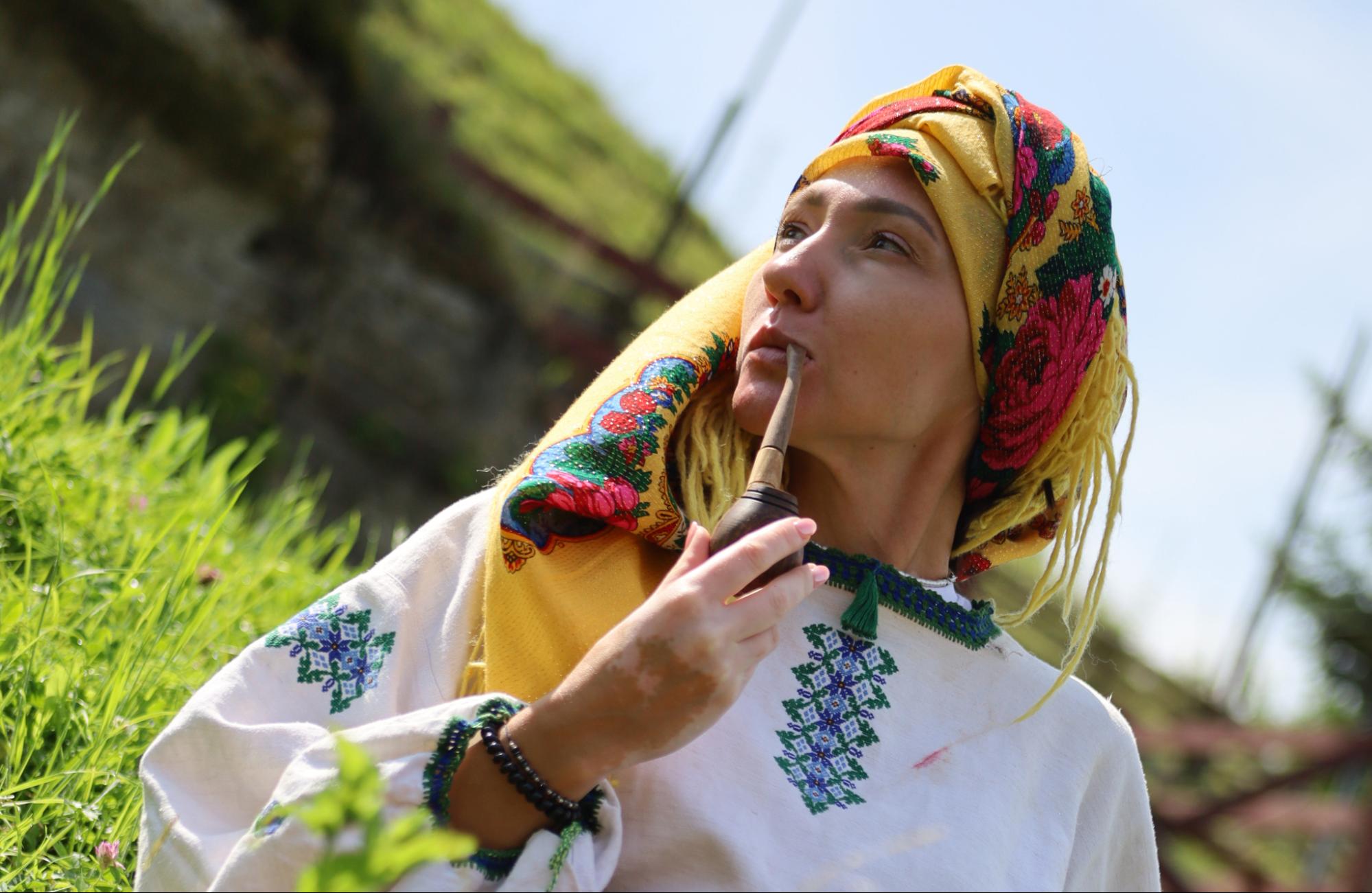
Natalya Nekypila
Natalya Nekypila has been in journalism since 2000 and in the team of Radio Nakypilo since April 2023. She joined the radio team in the most difficult period of her life — a month after her husband died in the war with the Russian invaders. She recalls that the work and sincere support of her colleagues helped her cope with the loss and directed her strength not to self-destruction but to adaptation to a new project. Currently, radio Nakypilo works with a studio and main office in Kharkiv, and part of the team works remotely. Nekypila also works remotely from Vinnytsia but goes on business trips to Kharkiv.
"The war affected me, as it did all conscious journalists — it activated resources I had no idea about. Working 24/7 for several months at the beginning of the invasion led to exhaustion and burnout after only a year of full-scale war," Nekypila recalls. "It seemed to me that the more and more efficiently I worked, the closer our victory would become. Probably, the majority thought so. But every person has a resource, and it is exhaustive." Her first breakdown was to feel that she couldn't handle such a load and desperately needed rest. Nekypila told Rubryka that she felt that she could not change anything in this extremely difficult situation and started losing motivation. The second, even greater breaking point was the death of her husband due to war. He went to serve at the beginning of the invasion but always supported Nekypila morally. It is clear that after the loss, she did not want anything and saw no point in continuing the struggle. Working in the Kharkiv media gave her the feeling that she was again doing what she should.
The director of radio Nakypilo, Yevhen Streltsov, who saw and felt the moral state of his colleague, suggested taking part in the retreat and changing the scenery and surroundings. Nekypila agreed, especially since participation in the retreat provided the opportunity to continue working but in comfortable conditions, with a break from daily household worries and reminders of the circumstances in which the journalist currently finds herself.
"Retreat for me is an opportunity to look at my life in the present time from the side. It's like stopping on a treadmill in the middle of a marathon and watching everyone continue running — exhausted, sometimes without a final goal. Someone is running, someone is barely walking, and someone has already fallen. And you can see it only by stopping," says Nekypila. There, in the midst of the peace and stability of the mountains, you understand that life is not always about survival, even if you lost so much. Life is about feeling yourself in it.
Nekypila says that the same thing happens with work. First of all, you have to understand why you are in this process and what is your mission and goal. But you need a pause to think. A break is a luxury these days. The retreat was such a "pause" for Nekypila.
"When I came to the retreat, there was a lot of chaos in my head and body — general fatigue from the pace of life. In the mountains, I seemed to slow down, contemplate, and breathe a lot. It helped to bring order to the chaos and to relieve the body of the tension of the event," the journalist shares with Rubryka. "In addition, the participants and I often talked about work and ourselves in it. These conversations helped to expand the understanding of the processes currently taking place in Ukrainian journalism. Since the journalists were mainly from the east and center of Ukraine, the retreat helped to analyze the situation in the regions through colleagues who work in local media. Plus, new relationships with people were formed."
Nekypila says that after the retreat, she feels changes in her condition, and although these transformations are still in process, she can now say for sure that she knows where you can and should "run away" when you approach the red line, beyond which is the limit.
"I know that mountains, leisurely conversations, and quality surroundings can comfort, distract, help slow down," the journalist is confident. The retreat showed there will always be those who care about you. "At the retreat, I genuinely laughed for the first time. It struck me. I also remember the silence and peace on top of one of the mountains of Verkhovyna — only the wind and the bells around the cows' necks could be heard. It's a wonderful feeling of constancy despite all the world's chaos."
Margaryta Ogneva, journalist of the Zaporizhia Center of Investigations: "Living and working in a front-line city is incredibly difficult"
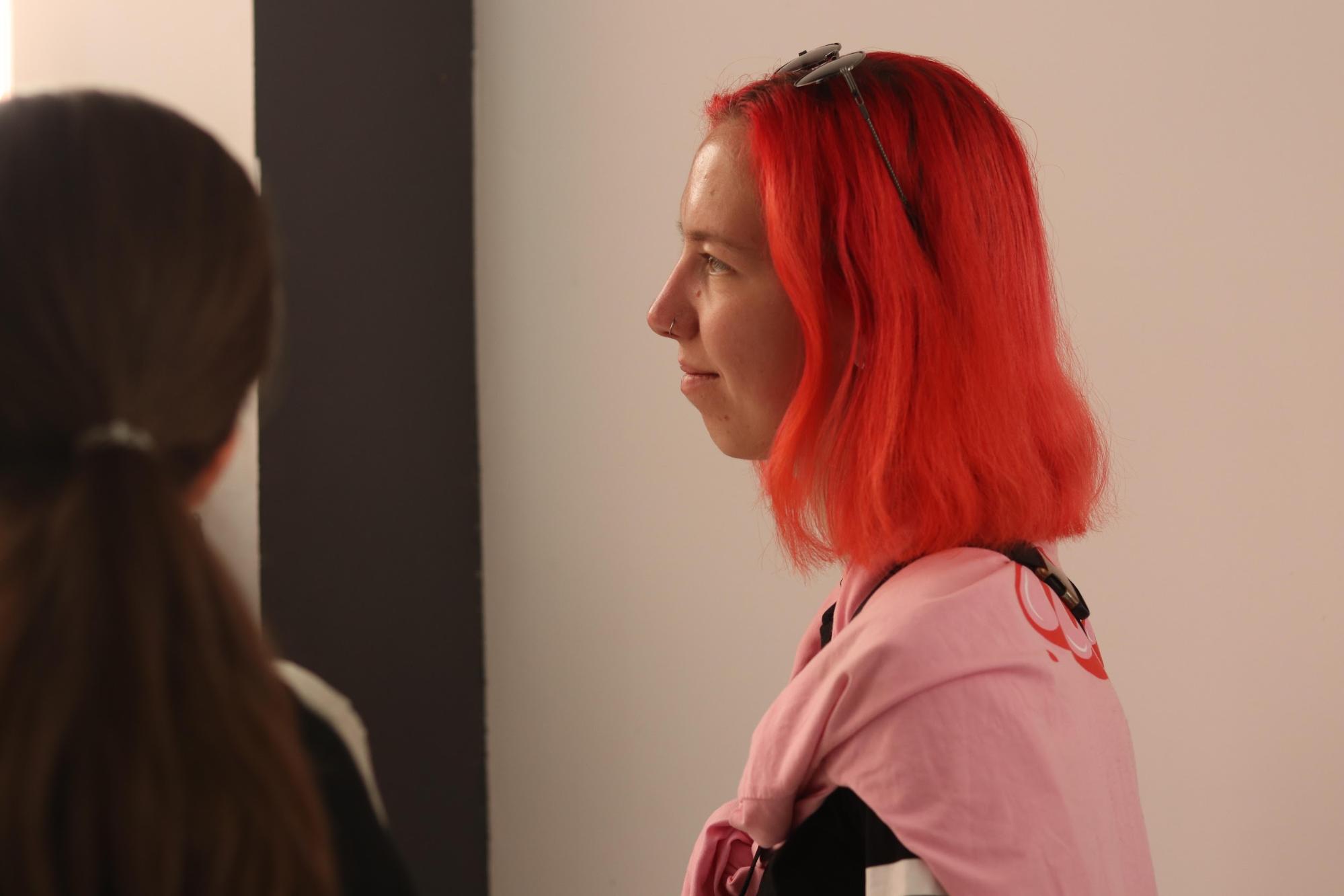
Margaryta Ogneva
Margaryta Ogneva got into the Zaporizhzhia Investigation Center, which since 2017 has been highlighting illegal decisions of local authorities, already during the war. She says that living in a front-line city for more than a year and a half is actually tough. The once peaceful and flourishing Zaporizhzhia has now become a city in which each of its residents needs constant restoration of their own integrity.
"You just think you've managed to pull yourself together, but there's another round of shelling — and you're in pieces again. You can talk about this for a long time, but the bottom line is one: it is challenging to live like this. I still do without psychological help, but I am actively thinking in this direction. Moral forces… they just come from somewhere again and again. From the thought that you have to keep working to live, that your work is important. And who, if not you?" shares the journalist.
Ogneva decided to go on a retreat for two reasons: she had an urgent need for psychological recovery and always dreamed of visiting the Carpathians.
"I don't think that the retreat was supposed to directly solve my problems or questions. At least I didn't set myself such a task. But it helped to reboot perfectly," Ogneva shares with Rubryka. "The daily excursions and activities were really cool. It was also nice that it was unnecessary to take part in them if you do not have the resources for it or you have to work (the specifics of the work: even in the retreat, sometimes you had to solve work tasks). Ogneva is convinced that such events should be repeated. This is both networking with colleagues from other regions and simply discovering new people for yourself. Plus, a change of circumstances, beautiful views, and unusual cuisine. "All this is simply wonderful! Of course, I advise others to try it. And if you're worried that you don't have anyone to take with you, that's not a problem either: you will definitely find company there."
Lesya Shovkun, deputy editor-in-chief of the online media outlet Novynarnia: "Retreat is simply necessary for Ukrainian journalists working in war conditions"
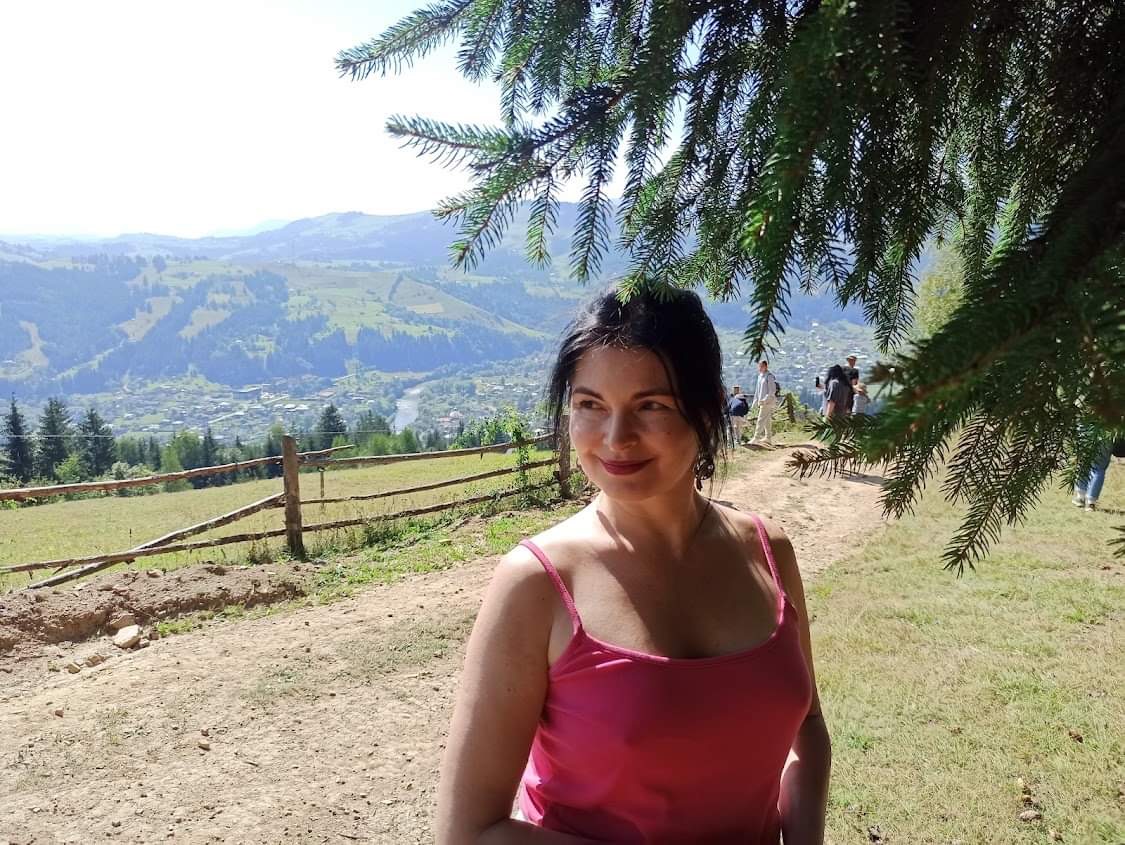
Lesya Shovkun
Since 2016, the Kyiv edition of Novynarnia has been covering events on the front lines, the situation in the army, the problems of active military personnel, veterans, and the civilian population affected by the war. Also, media journalists create many exclusives about events at the front, about Ukraine's defenders, and tell the stories of the deceased. Novynarnia journalist Lesya Shovkun explains: "For us, the war with the Russian aggressor has been going on since 2014. So when Russia invaded full-scale on February 24, 2022, our work only became many times more intense and exhausting. This did not come as a particular shock or surprise for us, as it did for most Ukrainians. On the contrary, in a certain sense, we sighed with relief that now we will not have to beat our heads against the wall and prove to people outside our patriotic "bubble" and to our Western partners that Russia is an enemy, that it has always sought to destroy us, that Russian culture and the Russian church are powerful components of Russian propaganda. That is, we knew what to do and how to work in this situation, to whom to contact for comments, to whom for help, etc."
According to Shovkun, the main challenge of the war for the Novynarnia team was primarily the physical capabilities of the human body since the flow of information from the media's profile topics has turned from a thin flow of war only in the east of Ukraine times to Niagara Falls. Accordingly, the load on everyone has increased critically.
"This especially applies to the editorial staff, to which I belong," Shovkun continues. "Because it is through us, the editors, that this entire flow of informational messages in the newsfeed, texts for proofreading, videos for staging, coordination of editorial plans, passes," explains the journalist. After half a year of working in this mode, the team is simply physically haggard. And after a year and a half, even more. At the same time, organizing at least some kind of vacation is almost unrealistic in such conditions. At the very least, because even for its minimal planning, additional time must be allocated.
Shovkun compares the offer to join a retreat from the NGO Lviv Media Forum to a jackpot: "They gave you a vacation in the Carpathians on a plate with three meals a day, a ready-made entertainment program, and the opportunity to meet colleagues from other regions. However, I still had to work because of the specificity of online media with a 24/7 working day. In any case, it is not comparable to constant working days without breaking away from production.
The retreat became an excellent opportunity not only to slow down and exhale but also to inhale mountain air. Shovkun says that even just swimming in the pool became quite a relief for her. She adds: "Also, the opportunities to meet and exchange contacts with colleagues from other regions and to get to know the Hutsul region, which I have visited until now, were precious."
The journalist emphasizes that before the full-scale invasion, Novynarnia constantly led a full martyrology of those who died in the war. They tried to talk about each and every one because they understood very well how important it is to know and remember every defender who fought for an independent and free Ukrainian state.
"We experienced each story personally, and no matter how many there were, the editors really couldn't hold back tears every time we published the stories about the fallen heroes of the month. Now, it is impossible to write about everyone, which is another big pain of ours," Shovkun sighs. Ukraine is losing its best people. These losses are very, very large regardless of specific numbers. "I can't say that I personally burned out or was exhausted to the brim psychologically. Yes, all this is very difficult, but it seems my psyche understands how important this work is in the historical context and works accordingly. I am aware that work in this mode will continue for a very long time, and I am psychologically ready for it. But at the physical level, the human body, unfortunately, is not so 'conscious' and still fails. That's why Ukrainian journalists who work in war conditions need a retreat."
Nataliia Kulakevych, editor of the website at the Slidstvo.Info investigative agency: "Mountains are the best medicine against the worst dreams and anxieties"
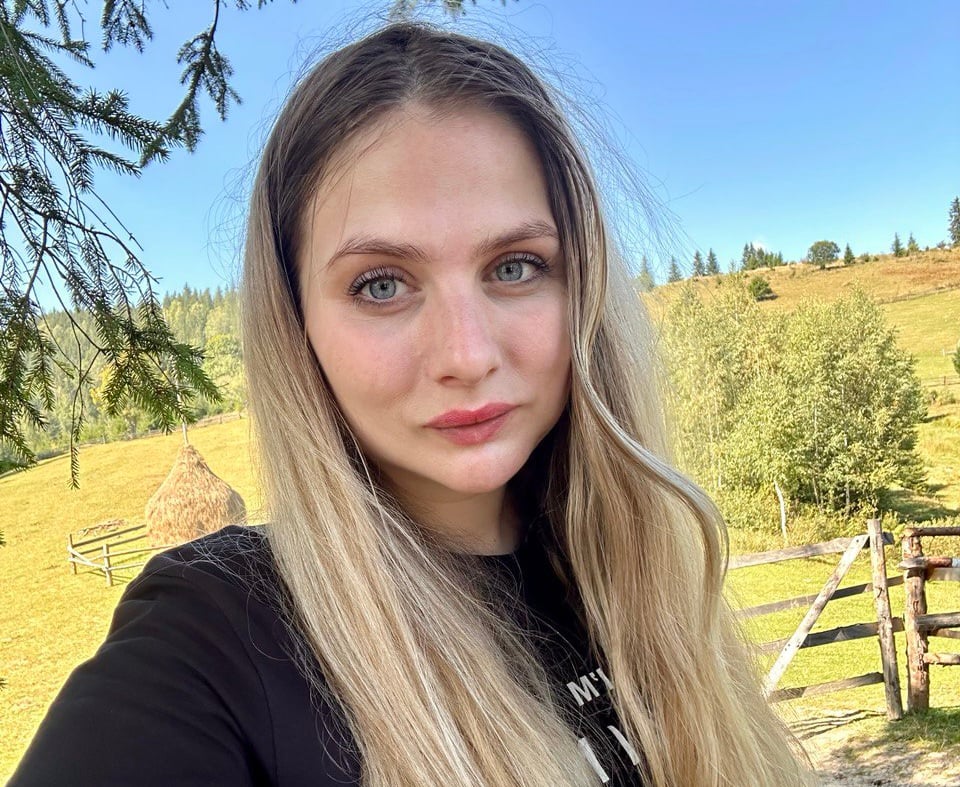
Natalya Kulakevych
Slidstvo.Info is a team of independent professional journalists. In peacetime, the publication exposed corruption and abuse of Ukrainian officials at all levels — they filmed investigative documentaries and special reports, wrote blogs, created texts, and participated in international investigations.
During the Russian-Ukrainian war, the media outlet slightly shifted the focus of its work — now, it creates reports from cities and towns shelled by the Russian military and identifies Russian military and Ukrainian collaborators.
Natalya Kulakevych, editor of the website at the Slidstvo.Info investigative agency, notes that it is emotionally challenging to work with materials related to war crimes. Colleagues offered her to participate in the retreat, for which the journalist is very grateful.
"During the retreat, the most valuable thing for me was communication with nature. The magical mountain scenery gave me a precious sense of peace for a whole week. We live in a reality of constant tension and worry, so the mountains are the best medicine against the worst dreams and anxieties," Kulakevysh told Rubryka. "I was most impressed by the music, in particular, the Trembita Museum dedicated to traditional alpine horn made of wood common among Ukrainian highlanders Hutsuls. I listened to stories about such different and equally filled with Ukrainian spirit instruments. It seemed that I got into some beautiful movie."
According to the journalist, retreats for media professionals are a mandatory therapy that should be prescribed to everyone at least once a year.
Retreats are needed to rest from the endless stream of news and stories that make up the canvas of every journalist's days and sometimes nights. The beloved Lviv Media Forum surrounds its residents with such warmth and care that it is impossible not to confess your love for it, says Kulakevych.
Even more useful solutions!
Psychologist's advice: what should media workers do to protect their mental health?
Today, much of the information that fills the daily airwaves is negative or emotionally heavy. Since no one has abolished empathy, everyone who works with large amounts of information personally experiences almost every story and every hostile crime.
"We must understand that professional burnout is not just a word for fatigue. Burnout is included in the International Classification of Diseases and is defined as a syndrome that occurs due to chronic stress at the workplace, which cannot be overcome in time. That is, if you notice and correctly recognize the first signs of exhaustion, you can prevent burnout," says Olena Borovyk, psychologist and psychoanalyst.
The specialist emphasizes that it is essential to know what is the most exhausting of the psyche. If we are talking about journalists, bloggers, and specialists in the media sphere, then the first such exhausting factor will be the volume of information that has to be processed. Our brain can maintain high productivity during intellectual work for an average of four hours daily. In the future, productivity gradually decreases, and to maintain the quality of work, more and more strength and energy are required.
Borovyk advises:
- Distribute work so that the most difficult tasks and peak loads take exactly four hours of your working time. It does not matter if it will be four hours in a row or with breaks. Other time can be divided between more routine or automatic tasks.
- Also, if you work with large volumes of various information during working hours, you should limit the consumption of "fast" content in your free time. Mindlessly scrolling through social networks, news feeds, short quick videos, simultaneous communication in several messengers with many people — all this may seem like an opportunity to distract and relax, but in fact, it is an additional information load for the brain.
- It is better to give preference to reading a book, going for a walk, watching a movie, or having a lively, pleasant conversation.
- It is essential to recognize the first signs of professional burnout in time to take a break, vacation, or consult a specialist before complete emotional burnout occurs.
In addition, many media specialists are now faced with the need to cover war crimes. This is a factor that leads to severe stress and can even cause mental trauma — witness trauma. Witness trauma is characterized by the fact that what is seen or read is perceived in the same way as if the person was a direct participant in these events. Therefore, the risk concerns not only those who are in hot spots but also those who work with information about these events.
Here, as noted by the psychologist, it is crucial to remember that one's own emotional reaction that may arise in response to working with information about suffering and trauma may seem, at first glance, inadequate, but it is actually quite normal.
There is also such a concept as media trauma, which is a kind of traumatic stress caused by information. People who work in mass media, such as journalists, photographers, and videographers, are also at risk of developing media trauma due to constant exposure to violent and tragic events.
The main symptoms of witness trauma and media trauma include exhaustion, stress, insomnia, anxiety, depressed mood, background feelings of fear or mourning, and an inability to detach from news and images that evoke traumatic emotions.
Usually, the first symptoms look quite mundane or insignificant, so they are easy to miss. This, for example, can be increased irritation, greater cynicism, and sarcasm, a decrease in motivation for work, a feeling of the monotony of days, events, and tasks, and some emotional "deafness" — a feeling of dulling of one's own emotions.
At this stage, it is important to:
- not ignore the symptoms and reduce the information load in any available way;
- also, if possible, talk about your experiences with those with enough emotional stability to listen to you and give you a chance to be heard. This could be a psychologist, a priest, support groups, or even a call to a psychological helpline.
The material was created and published within the framework of the project Strengthening the Viability of Ukrainian Media Outlets. The Lviv Media Forum implements it in partnership with UNESCO and with the support of the people of Japan.
The Lviv Media Forum team plans to continue implementing the project of retreats for journalists. If you have any questions or proposals for cooperation, write to [email protected]
Newsletter
Digest of the most interesting news: just about the main thing







